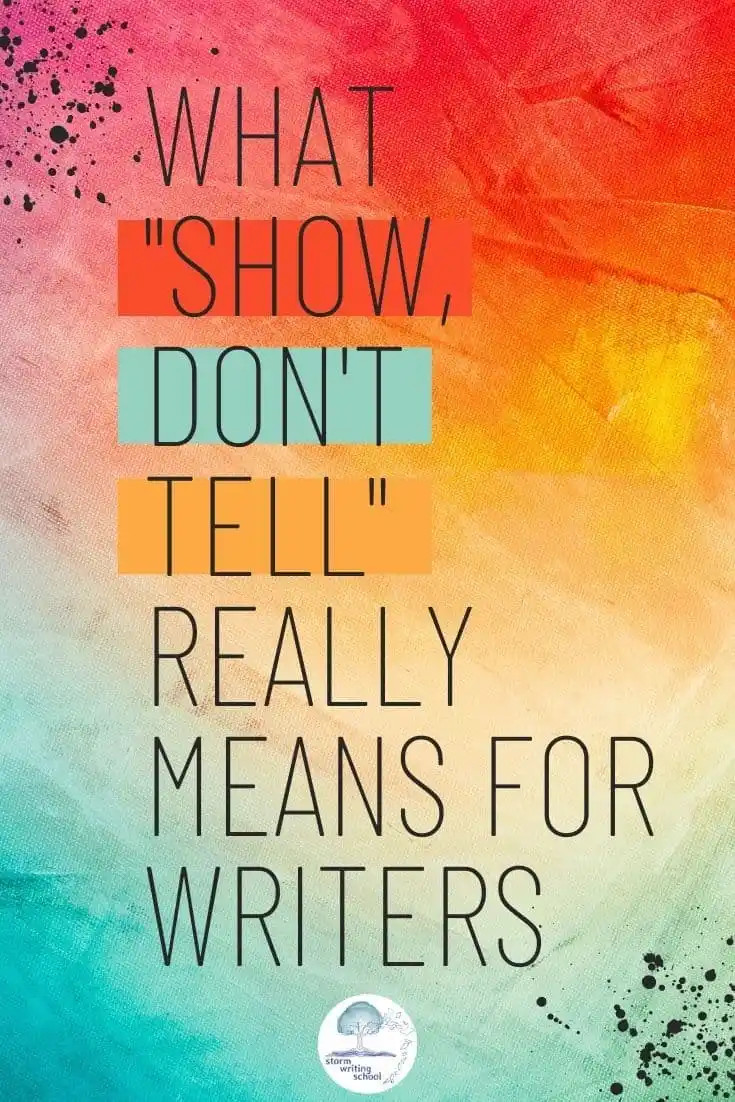May 3, 2022
Exactly What Does “Show, Don’t Tell” Mean?
by Samantha Hoffman
 Show, don't tell is something we writers hear constantly. It's said so much that you might feel you can't deviate from that advice, if we even know exactly what it means.
Show, don't tell is something we writers hear constantly. It's said so much that you might feel you can't deviate from that advice, if we even know exactly what it means.
Do we?
First, just know there are no hard, fast rules in writing. There are key elements that make a good story, but as soon as you think you can't depart from any of those, someone will come along and do just that, and present to the world something strange and unique, which will be wildly successful; something everyone wants to read, that earns a Pulitzer, that sells a gazillion copies, that blows us all away. You can break all the rules if you're so inclined, you just have to do it in an extremely, competently spectacular fashion.
For most of us, at least in the beginning, it's good to follow the basics of good writing. What makes a good story?
- Begin your story in the middle of the action
- Introduce a protagonist
- Establish the protagonist's goal (something is at stake)
- Something or someone prevents the protagonist from achieving this goal which creates conflict
- There is an inciting incident or complication that forces the protagonist to act
- There is a unique tone/voice/writing style
- The setting is described without slowing the pace of the story
- The dialogue is realistic and serves a purpose
This is great advice - it comes from the guidelines for CWA's Write City Magazine. (Submit your work here. Make sure it follows the guidelines.)
But we're talking here about show, don't tell. Chekov explains it best: “Don’t tell me the moon is shining. Show me the glint of light on broken glass."
The moon is shining is narrative. It doesn't draw us in. Narrative, in fiction, is mind-numbing. Don't explain the story to your reader, make them feel it. Paint a picture with your words. Make the reader see what you see in your head.
Instead of writing, "The baby cried in outrage all night long," describe it this way: "He was not the good kind of baby who cried out and then, sensing that no one was going to come running, rolled over and fell back asleep." Isn't that so much more engaging? That's from from Five Tuesdays in Winter by Lily King.
Study Luly King's writing, study the writing of other authors whose work you lose yourself in. They will show you how to do it.
Some articles that will be helpful:
From Tim Storm (be advised that Tim uses words like simulacrum and disambiguation. I love him anyway. I don't even care that he's smarter than I am).
From Jerry Jenkins.
From Tim Corson-Knowles
Writing is like any other skill; the more you learn, the more you study, the more you do it, the better you become.

Writer, editor, artist, personal assistant, private chef, runner (8-time marathoner), film and theatre buff, traveler… Author of What More Could You Wish For (St. Martin’s Press).
V.P. of the Chicago Writers Association, Executive Director of Let’s Just Write! An Uncommon Writers Conference.
Visit me at www.samanthahoffman.com
Affiliates/Partners
Testimonials
Contact
Join CWA
Member Directory
My Account
Writers Conference
Presenters
Agents and Publishers
Pitch Sessions
Sponsors
Scholarships
Speaker Registration
Book of the Year
Spirit Award
First Chapter Contest
Resources
Home
Chicago Writers Association
info@chicagowrites.org
Make a Difference!

